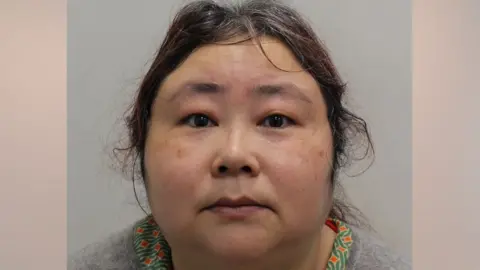Osmond ChiaBusiness reporter, Singapore and
Liv McMahonTechnology reporter
 Metropolitan Police
Metropolitan PoliceA Chinese national has been convicted following an international fraud investigation which resulted in what’s believed to be the single largest cryptocurrency seizure in the world.
The Metropolitan Police says it recovered 61,000 bitcoin worth more than £5bn ($6.7bn) in current prices.
Zhimin Qian, also known as Yadi Zhang, pleaded guilty on Monday at Southwark Crown Court of illegally acquiring and possessing the cryptocurrency.
A second person appeared in court on Tuesday to admit to their role in the scheme.
Malaysian national Seng Hok Ling, of Matlock, Derbyshire, pleaded guilty at Southwark Crown Court of entering into a money laundering arrangement on or before 23 April 2024.
According to the charge, he had been dealing in cryptocurrency on Qian’s behalf, “knowing or suspecting his actions would facilitate the acquisition or control of criminal property by another”.
Between 2014 and 2017 Qian led a large-scale scam in China which involved cheating more than 128,000 victims and storing the stolen funds in bitcoin assets, the Met said in a statement.
It said the 47-year-old’s guilty plea followed a seven-year probe into a global money laundering web which began when it got a tipoff about the transfer of criminal assets.
Qian had been “evading justice” for five years up to her arrest, which required a complex investigation involving multiple jurisdictions, said Detective Sergeant Isabella Grotto, who led the Met’s investigation.
She fled China using false documents and entered the UK, where she attempted to launder the stolen money by buying property, said the Met.
“By pleading guilty today, Ms Zhang hopes to bring some comfort to investors who have waited since 2017 for compensation, and to reassure them that the significant rise in cryptocurrency values means there are more than sufficient funds available to repay their losses,” said Qian’s solicitor Roger Sahota, of Berkeley Square Solicitors.
On Tuesday, the Court heard that confiscation proceedings had begun in an effort to retrieve more than £16.2 million from Ling, with the figure to be adjusted to reflect cryptocurrency rates when he is sentenced in November.
Some reports have suggested the UK government will seek to retain the seized funds.
The BBC has approached the Treasury and the Home Office for a response.
Reforms to crime legislation under the previous Conservative government aimed to make it easier for the UK authorities to seize, freeze and recover crypto assets.
The changes would also allow some victims to apply for the release of their assets held in accounts.
‘The goddess of wealth’
Qian had help from a Chinese takeaway worker named Jian Wen, who was jailed for six years and eight months last year for her part in the criminal operation.
Wen, 44, laundered the proceeds from the scam and moved from living above a restaurant to a “multi-million pound rented house” in north London, said the Crown Prosecution Service (CPS) earlier this year.
She also bought two properties in Dubai worth more than £500,000, the CPS said.
The Met said it seized more than £300m worth of bitcoin from Wen.
 Crown Prosecution Service
Crown Prosecution ServiceChinese media outlet Lifeweek reported in 2024 that investors, mostly between 50 and 75 years old, had poured “hundreds of thousands to tens of millions” of yuan into investments promoted by Qian.
Some of the victims – including business people, bank employees and members of the judiciary – were reportedly urged to invest with Qian’s scheme by friends and family.
The investors reportedly knew little about Qian, who was described as “the goddess of wealth”.
“Bitcoin and other cryptocurrencies are increasingly being used by organised criminals to disguise and transfer assets, so that fraudsters may enjoy the benefits of their criminal conduct,” said deputy chief Crown prosecutor, Robin Weyell.
“This case, involving the largest cryptocurrency seizure in the UK, illustrates the scale of criminal proceeds available to those fraudsters.”
Monday’s conviction marks the “culmination of years of dedicated investigation”, which has involved the police and Chinese law enforcement teams, said Will Lyne, the Met’s Head of Economic and Cybercrime Command.
Qian is being held in custody ahead of sentencing, which will take place on 10 November – as part of a two-day sentencing hearing at which Seng Hok Ling has also been asked to appear.
UK Security Minister Dan Jarvis said the conviction sent a “clear signal” that UK wasn’t a “safe haven” for criminals.
“Money laundering erodes trust, undermines our economy, and fuels the rise of serious organised crime,” he said in a statement.
The BBC has contacted the Chinese embassy in the UK for comment.
Additional reporting by Tony Han, Journalist, BBC Global China Unit.

Get our flagship newsletter with all the headlines you need to start the day. Sign up here.




